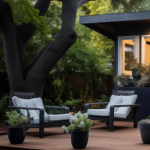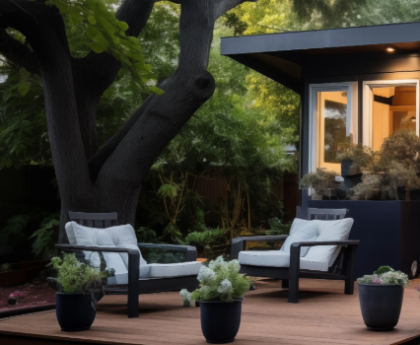
The Edmonds City Council Tuesday night continued its review of proposed updates to Edmonds City Code that would allow detached accessory dwelling units (DADUs) citywide. Several people testified during a public hearing on the code changes, which were recommended by city staff and the Edmonds Planning Board.
The draft DADU recommendations — approved by the planning board April 24 — are being considered as part of the city’s 2024 Comprehensive Plan update. A decision by the council is expected in the next few weeks.
Edmonds Planner Rose Haas began her council presentation by defining ADUS as “a small residence that shares a single-family lot” with a primary residence. The City of Edmonds currently only allows attached ADUs, but under new state legislation — House Bill 1337 — it must allow up to two ADUS per lot (attached or detached) by June 2025.
The city has been moving to implement the regulations sooner so that they can be included as part of Edmonds’ 2024 Comprehensive Plan update, now underway.
Among the other changes required by the new state legislation:
– No owner occupancy requirements (current city code now stipulates that either the primary unit or the ADU be owner-occupied)
– No parking required within a half mile of a major transit stop (city code calls for one off-street parking space in addition parking spaces normally required for a principal dwelling)
– Maximum size limitation no less than 1,000 square feet of gross floor area, defined as the “interior habitable area of an accessory dwelling unit.”
– No setback requirements, yard coverage limits, tree retention mandates, restrictions on entry-door locations, or aesthetic requirements that are more restrictive than for the principal unit.
– Allowing ADUs that are at least 24 feet high.
– Impact fees that are not more than 50% of fees charged for the principal unit.
City staff came up with its own set of proposals for accommodating ADUs in Edmonds, and those were refined by the Edmonds Planning Board, with a final vote April 24. Those recommendations were presented to the council Tuesday. They included:
– ADUs and DADUs should be no more than 1,000 square feet in size on RS-6 and RS-8 zones, and a maximum size of 1,200 square feet in RS-10 to RS-20 zones, which are larger lots. The latter would increase residents’ freedom to build ADUs or DADUs that will work best for them without the crowding that such buildings would generate on smaller lots.
– An extra parking spot should be added for a second ADU or DADU built on a lot, but not for the first. Properties within a half-mile radius of major transit stops will still need to adhere to the parking requirements outlined in HB 1337.
– Impact fees should remain at 50% of the amounts the city imposes on single-family homes, which HB 1337 allows.

“For the most part we really wanted to look at regulations that allowed some flexibility,” Planning Board Chair Jeremy Mitchell told the council. He acknowledged that parking “was a huge controversial topic” for the board to address, “and so we met the community half way. There were people who didn’t want to have any parking at all, and there were people who wanted an abundance of parking… to accommodate all these new structures. So we shot right down the middle and we said…for the first ADU, we’ll waive the parking because the principal structure already requires two spaces and then for the secondary ADU on the same lot, that’s where we would add an additional off-street parking space.”
Haas also noted that any request for an ADU permit would have to be reviewed by the city in terms of its compliance with utilities, public works and critical areas requirements, among others.
Some councilmembers expressed their support for expanded ADU options, citing the desire by residents to age in place or to have a place to care for an aging family member. Others were more cautious.
Councilmember Neil Tibbott asked for clarification regarding the state’s total gross footprint requirement of 1,200 feet, and whether that could translate into a two-story DADU with 1,200 square feet on each floor — for a total of 2,400 square feet. City Attorney Jeff Taraday confirmed that such a configuration would be allowed.
Councilmember Dotsch encouraged staff and the council to start “thinking holistically” about the various state housing bills that the city needs to comply with. (These include not only HB 1337 but HB 1110, which requires cities to authorize minimum housing development densities and permit specific “middle housing” types in any zone that allows for detached single-family residences, and HB 1220, which requires cities to promote a variety of housing types and differentiate these housing types to affordability levels.)
“I really feel like we need to dive a little more into all the pieces that are going to impact each individual lot in our single-family neighborhoods,” Dotsch said. “When most people start thinking about living in Edmonds and in a single-family house in a neighborhood, this type of development isn’t the first thing they think about happening next door.”
She cautioned the council to be careful about “going beyond what’s required (by the state) at this point in time because already what’s required is going to be quite impactful.”
Council President Pro Tem Will Chen asked for confirmation that the ADU would be attached to the land deed of the primary residence and that the two structures couldn’t be subdivided, but yet state requirements say the an ADU could be sold. Haas replied that such a sale would be possible through a private agreement between the owners of the residences.
Some councilmembers expressed enthusiasm for having preapproved designs available for ADUs so they could advance quickly through the permitting process. Because that initiative would require separate funding, Planning and Development Director Susan McLaughlin said that it would be pursued after the code is implemented, likely as part of the 2025 budget process.
“The way I’m looking at this is…not everybody’s going to want to build an ADU or DADU,” Councilmember Chris Eck said. “Whether it be cost or they don’t have the need to do it.” She then asked McLaughlin to confirm the assumptions made — as part of the city’s Comprehensive Planning process — for the percentage of housing that ADUs would constitute in Edmonds during the next 20 years.
McLaughlin and Haas explained that the city used Washington State Department of Commerce guidance to come up with a figure of approximately 2,000 in ADUs in the city by 2044 — which is based on 10% of the eligible lots building two ADUs each. “I don’t realistically think — unless we incentivize or reduce a lot of barriers — that we are going to get that 2,000,” McLaughlin said. Haas also noted that ADUs — which typically cost between $150,000 and $300,000 — are not considered affordable housing. “This is a big investment that a homeowner is going to make,” she said.
Eck then related that she and her husband are in the “sandwich generation” in which they are talking about an ADU both as a way to care for an older relative and a short-term opportunity for a younger relative who can’t yet afford a home.
“I’ve had a lot of conversations to this point with others who are in similar situations,” Eck said. “It’s a very important conversation but again not everyone will choose it. It’s about property owners having those choices.”
Members of the public offered a range of opinions during the public hearing. One resident said he recently retired after spending 50 years building homes, and he was skeptical that Edmonds had enough available lots in sizes that would accommodate an ADU.
Another resident said he was grateful the city was moving forward with the idea of expanding ADU options, noting that he has a parent with Alzheimer’s and has already been working to convert a portion of his existing home into a living space for her.
Edmonds resident Janelle Cass said she believed the ADU policy will have “a downstream effect” on density and she encouraged the council to delay a decision on ADUs — and instead incorporate it into the Environmental Impact Statement process for the Comprehensive Plan.
Greg Brewer of Edmonds said the city should implement the state’s minimum requirements for ADUs and consider expanding them later after the effects of those regulations are more clear. “It feels like the impacts are being severely downplayed by staff,” Brewer said.
Edmonds resident Mackey Guenther said he was excited the city was considering “relegalizing something that has been of a part of our history for at least a hundred years now. ADUs were originally called carriage houses in the early days of Edmonds. If you look downtown, y0u’ll see them all around.”
Guenther also touched on the issue of parking related to ADUs, stating that “if people want more parking spots they should totally have the freedom to build them. And if they don’t want parking spots, they shouldn’t be arbitrarily required to have them.”
He noted that a 2020 Seattle study of parking minimums found that “70% of developments in Seattle with no parking requirements did include some parking.”
In other business, the council:

– Heard a proclamation for Public Works Week. (The Edmonds Public Works Department is inviting the public to a Touch a Truck event from 10 a.m.-1 p.m. Friday, May 24 at Centennial Plaza, 121 5th Ave. N. Learn more here.)
– Voted unanimously to move a proposal for issuing $11.7 million in bond debt for water and sewer projects to the next council meeting for a full discussion.
– Also voted unanimously to send to next week’s consent agenda a measure that changes the date of its monthly council committee meetings from the second to the third Tuesdays of the month. This will allow staff to include the most current monthly financial report in the finance committee meeting packet
— By Teresa Wippel



